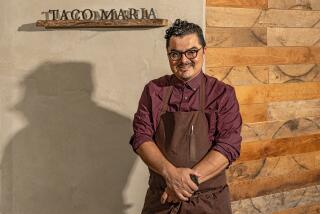Salcido Arraigned in 7 Murders; Plea Delayed for Medical Testing
- Share via
SANTA ROSA, Calif. — Former winery worker Ramon Salcido was arraigned Friday on charges that he shot and killed his wife and a supervisor and used a knife to murder his two daughters and three other family members in last week’s rampage through Sonoma County.
Salcido, wearing a maroon jail-issued jumpsuit, spoke softly and only briefly in his first court appearance since being arrested Wednesday in his grandmother’s hometown in northern Mexico. He was returned to the United States by private jet Thursday night.
“No, sir,” Salcido responded when asked by Municipal Judge Knoel Owen if he could afford an attorney. The Sonoma County public defender was promptly appointed to represent Salcido, who was shackled and unshaven.
Won’t Have Interpreter
Salcido also said there was no need for Spanish interpretation of the proceedings. “I don’t need an interpreter,” he said, noting that he had spoken English during his eight years in California.
The charges contend that Salcido committed multiple murders, a circumstance that would make him eligible for the death penalty under California law. Owen observed from the bench that this was a “capital case” and warned that Salcido must be represented by an attorney at every proceeding.
Pleading was delayed until May 5 at the request of Sonoma County Public Defender Marteen Miller, to allow neurological and pyschiatric tests of Salcido, who was described after the rampage as a peaceful, caring father but also as a jealous, hot-tempered husband.
Before the hearing, Miller told reporters he wants the tests to determine if Salcido suffers from any kind of brain tumor or lesion. “If what they say he did is true, I expect to find some definitive brain damage,” Miller said.
Chief Deputy Dist. Atty. Peter Bumerts agreed to the delay, but added, “Justice delayed is justice denied, and therefore we would ask that the case be moved along.”
The family victims were Salcido’s wife, Angela, 24, two of his children, Sofia and Teresa; his mother-in-law, Marion Richards; and her two daughters, Ruth and Marie Richards. Tracey Toovey, a supervisor at the winery where Salcido worked, was also slain, apparently because Salcido thought Toovey was having an affair with his wife.
Salcido was also charged with the attempted murder of his daughter Carmina, who was found with her throat slit on a remote road next to the bodies of Salcido’s other daughters. Attempted murder charges were also filed in the shooting of Kenneth Butti, a winery co-worker of Salcido, and the attempted shotting of Terri Lefter Butti. Witnesses said Salcido’s gun misfired when he pointed it at the woman and pulled the trigger.
No charges were filed that alleged the victims were sexually attacked, although Sonoma County authorities had originally said the Richards’ girls were raped or molested. Bumerts said “no comment” Friday about the sexual attacks charge.
Owen issued a gag order at the request of the prosecutor that bars attorneys and investigators from discussing the case. Bumerts said the order was needed to ensure that the trial “takes place in a courtroom, not on a sidewalk or in a television studio. . . . This office wants to see everyone receive a fair trial.”
Change of Venue
However, the public defender said he thinks the notoriety of the case already threatens Salcido’s chance for a fair trial. He said a change of venue would be requested.
“That’s the only absolute in the case,” Miller said.
Unlike Thursday night--when a boisterous crowd of 150 demonstrators greeted Salcido’s return to California with chants of “Kill him!”--only a few people showed up at the Santa Rosa courthouse for the 4 p.m. proceeding.
Still, security was tight. About 75 people, half of them journalists, were allowed into the courtroom after passing through metal detectors and having their bags searched.
“The public is incensed by the acts he is alleged to have commited. So we have to be very protective,” Sonoma County Sheriff Richard Michaelsen said.
Inside the Sonoma County Jail, Salcido is kept isolated in a maximum-security area. Jailers check him at least every 15 minutes, authorities said.
Salcido was arrested in the Mexican state of Sinaloa, where he was born, in a joint effort by the Mexican federal judicial police and U.S. agents. He was taken without incident in Bamoa Pueblo, a town where his grandmother and other relatives live.
Although some authorities still insist that Salcido was captured at a roadblock set up to snare drug traffickers, other sources close to the operation said he was arrested about 1:30 a.m. Wednesday at the train station in Bamoa waiting for a late train bound for Guadalajara.
Mexican authorities had closed in on him Tuesday, questioning men on the street in Bamoa and stopping cars at the entrance to Estacion Bamoa, an area of Bamoa Pueblo where the train station is located.
Residents of Orba Bamoa, another section of the town, said they had seen a man fitting Salcido’s description at the home of his maternal grandmother, Jesus Armendariz. Neighbors said he may have stayed in a makeshift, earthen-floored room next to the brick two-room house where Armendariz lives.
Truckloads of Mexican soldiers and police swooped down on the grandmother’s house about 1 a.m. Wednesday, but witnesses said that if Salcido was there he may have had time to get away because the authorities initially woke up the wrong household.
However, after the soldiers took a family friend from the grandmother’s house, Salcido was arrested a few minutes later at the nearby train station. He was flown to Mexico City and “deported” into the custody of U.S. officials, although he is not an American citizen.
While Salcido was arraigned Friday, his surviving daughter was recovering from a second operation at Petaluma Valley Hospital to repair damage to her throat.
She was listed in good condition and has been able to sit up and walk, although she breathes through a device inserted in her neck.
Morain reported from Santa Rosa, Roderick from Los Angeles. Also contributing to this story were Times Staff Writers Patrick McDonnell in San Diego and Robert Chow in Sonoma County.
More to Read
Sign up for Essential California
The most important California stories and recommendations in your inbox every morning.
You may occasionally receive promotional content from the Los Angeles Times.










